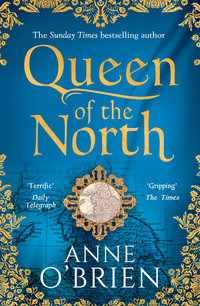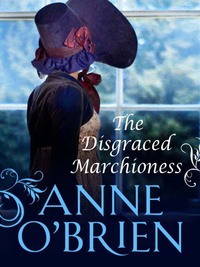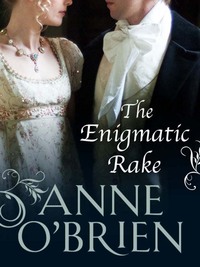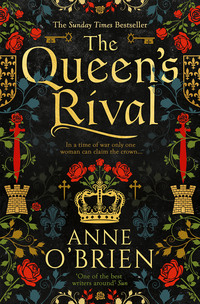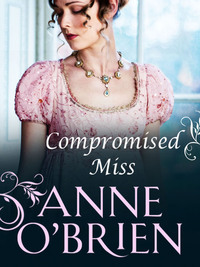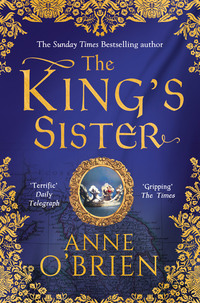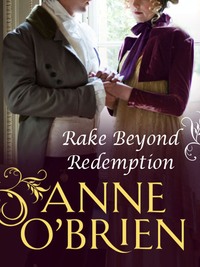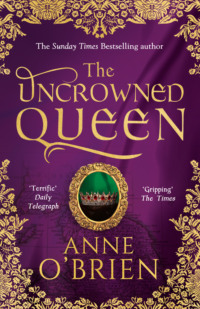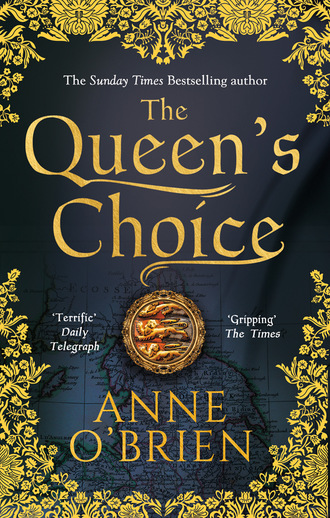
Полная версия
The Queen's Choice
The words shivered over me, through me, and I replied as I wished to, as he would want me to. As, now I realised in those moments of blinding revelation, John had given me permission to reply. Flattening all my pride, my lips burning as I spoke, my tongue forming the words I had never said before to any man, and with such ease:‘I love you, Henry of Lancaster.’
‘There, it is done. Our love acknowledged in God’s presence.’ He smiled at me, all his beauty restored, all the harsh anger of the last hour stripped away. Yet he took a step away from me. ‘I will not kiss you again.’
But it was not enough. Not at all enough.
‘Then I will kiss you.’
And with a step I did so, abandoning my habitual reserve, as with grave courtesy, mouth against mouth, reawakening the same sensations so that my heart beat hard beneath my bodice, my blood raced beneath skin that suddenly felt fragile.
The kiss ending, I pursued what I desired without permission, tracing the contours of Henry’s face with my fingertips, as he had traced mine. The straight nose, the uncompromising brows, the line of his lips, the springing texture of his hair, the contour of his jaw, as if I might absorb a memory that would remain with me for the rest of my life. And this from a woman who guarded her emotions, shielding herself from any power to hurt or destroy. I was shaken with amazement at my courage as I allowed Henry to read my thoughts, my utter longing.
At last I let my hand fall away.
‘Will you remember me?’ Henry asked.
‘Yes. I will remember.’
It seemed to me that an abyss was suddenly yawning between us.
‘You will be careful,’ I said.
‘Yes.’
A tense little silence fell, tight-held with unspoken emotion, as once more he gathered my hands into his. The warmth was enough. It would have to be enough.
‘I will use the Book of Hours, every day.’ It was Henry who broke the silence. ‘Will you pray for me? Even though…’ He shrugged, his smile a little twisted.
Even though I stir up insurrection against my cousin. ‘Yes. I will pray for you.’
‘There is so much I would say. But we both know it would be wrong.’
‘A betrayal of trust and much kindness.’ I sought for the words amidst my grief that we might never speak again. ‘It is in my heart that you succeed. And that you find a wife who will bring you strength and comfort.’
‘She will always be second best. A pale shadow. I must not let her know my heart is given elsewhere.’ He raised his head, listening, becoming aware of the outside world and all it demanded from him. ‘I must go, Joanna. It will be best if you remain here…’
One of the little windows beside us had been opened by the priest to allow a breath of air to enter. Seeing it, inspired by some quirk of his imagination, Henry drew me with him as he placed the palm of his hand flat against the dusty glass, fingers spread across the deep blue and red and gold of the craftsman’s art in depicting an angelic throng. And without a word passing between us, I placed mine on the opposite side of the pane, so that my palm matched his perfectly, spreading my fingers so that they covered his as much as I was able. The glass was sun-warmed, the colours deep and rich, heavy with gilding.
It was not a kiss. No it was not, but it was as if the colours bound us together.
‘I will never forget you,’ he said softly.
‘Will you write and tell us?’ I asked. ‘To tell us how you fare?’And then I wished I had not asked. Better to let our lives diverge as they must without keeping the useless skeins intact. ‘No. I think you should not,’ I added.
I knew he understood, for he nodded. ‘I will when I can. It will be all about armies and finance and inheritance. Farewell, Joanna. Farewell, my love.’
‘Adieu. God go with you, Henry.’
He was the first to remove his hand. The colours around me seemed less bright.
When Henry collected his accoutrements and the book, despite his express wishes, I followed him out into the courtyard to keep a last, final image of him, and as I did so, a thought touched me.
‘Why did you come here today? If you would refuse John’s proffered aid, why travel so far? You could have told us of your intent by courier.’
Henry turned.
‘You know the answer, Joanna.’ Never had my name sounded so like a caress. ‘It was to see you, even if we could not be alone, to say goodbye. I was not so soaked in passion at Richard’s injustice that I could leave you without your knowing.’
So he feared death. He feared for the future. But he loved me enough to put his fears aside and come to me.
Henry bowed, to any onlooker the bow of the most respectful of courtiers to the Duchess of Brittany.
‘I may die in battle. I may succeed in taking back what is mine. I may wed again. Whatever the future holds for me, I swear I will never forget you, in this world or the next.’
*
‘He has gone.’
Could any phrase be more empty, more lacking in hope?
I had returned to our chamber with its rounded walls and fair aspect. I could have gone back to the garden, where the shouts and laughter of the children carried to us, a shrill squawk of impatience cutting through the rest. But I could not laugh with them. I could have returned to the chapel antechamber, to sit on the tiles in the dust and allow the sun-warmed colours to heal my loss. But the Duchess of Brittany did not sit on the floor and mourn. Besides, it would have been a coward’s way out. I had to face my husband. The generosity of what he had done shivered over my skin, like the brush of a goose-quill. For now I understood the quality of the gift that John had bestowed on me, a gift of vast proportions, worthy of a man with a truly great soul.
Where was my loyalty now? Treachery was not only committed by men who took up arms against their liege lord, for had I not snatched at the gift John had given me?
Head lifted, spine straight, I walked in, to stand before the table where John had taken up his occupation with pen in hand, a map under his elbow. At his side, Henry’s empty chair and discarded wine cup. My eyes were on my husband’s when they lifted to my face.
‘He has gone,’ I said. ‘I gave him the Book of Hours.’
‘Yes.’ His voice was very gentle. ‘I knew you would. And you said farewell.’
‘Yes.’
‘You have an attraction towards him. Or I might even say that you love him.’
A statement. Two statements, not questions. And so simply expressed. Not wrapped around in troubadour’s words or in the accusation of a furious husband. It was as if John had struck me, but not a hard blow and there was indeed no accusation in his face. Only an acceptance.
‘Yes, I do,’ I admitted simply. I would not deny his generosity with a lie. ‘I love him without reason. Without cause. Without any encouragement from him. Or from me.’
Hands folded, breathing held in check, I could say no other. Nor could I apologise for what had been not of my seeking. All I could do was hope he would understand. And forgive.
‘I can see it in you.’
‘You sent me with the book,’ I said, as all had become plain, like an outline etched on glass. ‘So that we could say adieu alone.’
‘And anything else that needed to be said between you—without an audience.’
So he had. It had been deliberate, as I now realised. An offering of such impossible indulgence, so that Henry and I might speak of this emotion that held us so strongly. For John had given me—had given both of us—his permission to say farewell. He had offered me his permission to acknowledge the love that had so wantonly undermined the vows made in my marriage to him. He had allowed me his permission to admit, without treachery, that I loved Henry of Lancaster, and then draw a line of finality beneath it, for the Duke’s future was far distant from mine.
In that one astonishingly clever and compassionate move, John had demolished the pride in me that had refused to allow me to acknowledge, or certainly act on, so flighty an emotion as love. What manner of man did that make my husband? One of such honour and magnanimity beyond my imagining. Or beyond my deserts.
‘I cannot believe your indulgence towards me,’I said with difficulty. ‘And I am ashamed. I am sorry. I have betrayed you.’
John shook his head. ‘You have never done that.’ Then: ‘Will you go with him? To England?’
If John’s knowledge of my feelings had rocked the foundations of my self-control, this set my belly to roil. Go with Henry? Abandon my marriage and family? How could he think it of me?
‘No, John! Never! How could I do that?’
As he swept the feather of the pen across the carefully drawn coastline, his expression was benign.
‘You could if you wished it enough. There would be scandal, but men and women have parted throughout the ages, when the horror of living apart from the one they loved became stronger than the fear of the world’s condemnation.’ He placed the pen on the table and linked his fingers quite calmly as if discussing some matter of business. ‘It is not given to everyone to love with fervour.’ And when I would have denied any emotion so extreme, John raised his hand. ‘Your love for him is immeasurable. I see it in your face when you look at him. It astonishes you.’ His mouth took on the faintest of smiles although I thought there was no humour in him. ‘You never looked at me like that. Nor did I expect it. Ours was never that sort of marriage. Will you go with him?’
‘He has not asked it of me.’
‘No. He would not, of course. He is a man of honour. But would he wish it?’
‘I don’t know. We did not speak of such things.’
‘Both too honourable.’
‘But I am not honourable.’ Confession was difficult but must be made. ‘I would never betray you in body, but my mind knows only disobedience. I cannot govern it.’
‘Nor do you have to.’ John stood, walking round the table to stand before me. ‘Our marriage was one of political alignment. We both knew that. It was not one of love.’
‘But it should have been one of loyalty. I hope I have been a good wife to you.’
He took my hands in his, his thumbs stroking over my wrists where the blood beat, heavy with guilt. And loss.
‘I can think of none better. Three times I took a new wife to bed, making the best alliances I could for Brittany. Mary Plantagenet. Joan Holland. Both English, they were good wives. But you have been the best. Do we not talk? Do we not share interests and laugh together? Do you not share my duties in this land which is not yours by birth? No man could ask for a better woman at his side in affairs of business. You have given me the gift of your intellect and the finest brood of children any man could ask for.’ Leaning, he placed a kiss between my brows. ‘I’ll not upbraid you for discovering an attraction for another man. I am nearing my sixtieth year and can never give you the passion that Henry of Lancaster could give you. You are still so young…’
He touched my lips with one finger when I would have remonstrated.
‘No. Listen. I give you permission to think of Henry without guilt. It was never my intention to replace the tyranny of a deranged father with that of an old and importunate husband.’
I would not be silenced. His nobility was a marvel that tore at my heart. So much emotion, all in one afternoon.
‘Ah, John. That is not how I see you. You are no tyrant. Nor will I ever leave you. My duty lies here with you and our children. More than duty. My affection is bound up in all we have here together. Can you question my loyalty?’
‘No, never. And I accept your word. I think you are my friend as well as my wife. You always have been, since that first day when as a young girl you took your vows.’
‘And so I shall remain. I have said my farewells. Henry will go to England, he will become King if fortune smiles on him, and perhaps my cousin Mary will be offered to him once he is respectable again with a crown on his head.’
‘Perhaps so.’
And John folded me into his arms, his hand gently on my head so that my face was pressed against his shoulder. Tears were heavy in my chest, for Henry’s danger, for John’s nobility, for my guilt, but I would not weep for another man in John’s arms. That would indeed be a betrayal. How generous. How caring. I had not thought that John loved me, but then, there were so many degrees of love. My gratitude for his understanding was overwhelming but I would not thank him again for it. It would be a denial of his own grace and compassion in making the sacrifice.
It would be another layer of betrayal, if I accepted the right to think of Henry.
Thus, all decided however hard it might be, I would continue to be the best wife that I could. I would banish Henry. And if I could not, then he must exist on the very edges of my thoughts. That was what I promised with my forehead pressed tight against the sumptuous weave of John’s tunic, his arms a haven around me. I would put Henry in his proper place. I was Duchess of Brittany. I would dedicate my life to that.
John was the first to move, raising his head, looking towards the window.
‘That sounded like tears. Perhaps we should intervene…’
‘I think so. Our daughter still has not the patience worthy of the future Countess of Alençon.’
‘She will learn. She will learn well from her mother.’
We went down to the riverside in accord. No one would ever guess that my thoughts struggled to fly elsewhere, rather than remain here in this sun-washed garden where my daughters clamoured for attention and my husband dropped a kiss on my cheek as he placed Blanche on my lap. I hugged her close, as I held tight to the marvellous gift that John had just given to me, the freedom to admit, at last, freely and without restraint, my love for Henry of Lancaster.
*
‘He has done it! He has actually done it, by God!’ ‘Who has done what?’ I barely looked up from yet another damaged lute-string. Marguerite had been practising, ineptly.
John patted me on the head as if I were Marguerite, an endearing habit. ‘Henry, of course. Our Duke of Lancaster has achieved the impossible, and, in retrospect, I’m not sure what I think about it. And the fact that I actually encouraged him. Write to him!’
Thus John’s announcement in the autumn of that year.
And so I wrote.
To my honoured lord and cousin, Henry, King of England, I write from myself and my lord the Duke to express our pleasure at your achievements. We heard the news with relief and know that you will uphold justice in your new realm. We hope that you continue in good health and that your children do likewise. We will continue to pray for you, that the Holy Ghost will keep you safe in His keeping.
Henry had regained his inheritance, but more than that. Henry had taken the Crown of England for his own. With Richard leading a campaign to Ireland and Henry landing on the coast far to the north east, supporters had come to the exiled Duke of Lancaster, men of power, men of influence. Friendless no longer Henry had taken Richard captive and now, crowned and anointed, it was Henry who occupied the throne of England. I imagined the whole consort of European rulers shivering in their respective shoes at the success of such an enterprise. The rightful King of England was overthrown, another sat in his place. A dangerous precedent indeed. No wonder John’s thoughts were ambivalent.
I wrote again, precise and formal as required:
We would ask that you keep us informed of your good fortune. It is in the mind of my lord to remind you of a promise to consider a trading agreement to calm the increasingly acrimonious situation between our fishermen.
I did not think I had ever written so unfeeling or so valueless a letter.
We assure you of our future goodwill.
I signed it Joanna of Brittany, with a flourish, and used John’s seal. Then I sat back, imagining what I would have added to the end if I were free to do so.
I have agonised over your safety, and can now rejoice with you in the restoration of all you had hoped for, and more. I am well and my good wishes towards you as fervent as they ever were. There is no place for me in your life, but I hold you close in my heart today and every day.
But I did not express one word of that, rather gave the document into the hands of our chamberlain for it to be dispatched to the English Court by courier. It would be a good thing all round if Henry did not reply. My moment of passion, joyous as it had been, was at an end. Henry’s destiny was assured.
Chapter 4
November 1399: Château of Nantes, Brittany
‘Do you suppose we’ll be ready some time before our Christmas festivities begin?’
It was an excellent day for hunting, bright and cool with fitful sun and a breeze to shiver the reeds by the river, but John was unusually impatient. We were taking out the hawks, a brace of brache hounds and our eldest children.
We had not heard from the new English King. How would he have time to write personal letters when his days were dominated by settling England into good government after surviving the throes of insurrection? With Richard imprisoned in Pontefract Castle, Henry would be faced with a delicate handling of affairs. Writing to Brittany would be the last thing on his mind. Deliberately I had thrust him into the shadows of my life at the same time as I continued to include him and his family in my prayers. I would be happy for him, reunited with his sons and daughters, the injustices of the past laid to rest, but I refused to let any further memories encroach. There was no place for memories in my life.
‘Are we perhaps ready at last?’ John surveyed the party.
And in that moment, in the splash of sunlight across his face, I thought he looked weary. He had not slept well, that I knew, nor, unusually, had much enthusiasm for breaking his fast.
‘Do you really want to do this?’ I asked quietly.
John had been from home until the previous day, travelling to the far outreaches of his jurisdiction, renewing friendships over wine and hunting, sitting in judgement where necessary, while I had held audience with diplomats and merchants here at Nantes, discussing new tolls and minting rights, employing new minstrels to enhance John’s dignity when he entertained visiting magnates. Essential but minor matters compared with John’s constant burden. I knew that it was no easy task for him to preserve his hold on this volatile duchy whose past history had swooped acrimoniously between the territorial claims of both England and France. How hard he had worked to keep the Breton lords firmly behind him, not least in creating his new chivalric Order of the Ermine to enhance loyalty to his dynasty. With four thriving sons, of which John was inordinately proud, our dynasty was under no threat.
‘Hunting can wait until you are more rested,’ I suggested, concerned by the imprint of strain around his eyes, the unexpected shadows.
‘And what would our offspring say if I called it all off now?’
‘They would be polite, as they have been raised.’
‘Their disappointment would be palpable. Not to mention tears from Marguerite.’ Who had a tendency to play on her father’s soft heart. ‘We go. Don’t worry, Joanna. I am too tough an old bird to be brought low by a se’enight of touchy vassals demanding my time. Just too many hard roads, too many fast meals between one meeting and the next and too much inferior wine. It rots the gut faster than being on campaign. Now—let’s show the children how to fly a hawk.’ He already had one, hooded and leashed, on his fist. But as we rode out I saw him hand it back to his huntsman and rub the heel of his hand against his breastbone.
‘John…’
‘Don’t fuss, woman. Keep an eye on Arthur.’
He kicked his mount into a smart canter, not waiting to see if we followed to cross the water meadows towards the river. At fifty-nine years he was as hale as the young huntsman who kept pace with him, as energetic as the children who could all ride well. We pulled up in good form amongst the sedges where there was a quantity of duck and heron to give us sport.
‘Look.’ Marguerite pointed at the geese that dabbled in the shallows further along the river.
John pushed his horse on again. Then stopped, pulling clumsily on the reins. He coughed harshly. In an instant I was beside him.
‘John…’
He waved me aside, gripping his reins more firmly as if he would canter on, then dropped them, grinding a fist hard against the centre of his chest.
‘We don’t need to do this.’ I dug my fingers into his sleeve, trying to recover his reins at the same time, touched by a sudden dread. I had never before seen John drop his reins.
‘I need a moment. Just a moment…’ And then a harsh rattling breath in his chest, and I felt his weight press against my grip. I tightened it but I knew I could not hold him.
‘I need help…’ I raised my voice.
The servants were beside me in an instant, but help did not come fast enough and indeed I could not hold him. John toppled from saddle to ground with a groan. I followed, abandoning both horses, sinking to the chill grass to take his head and shoulders across my lap. His face was ashen, lips pulled back in a rictus.
‘Wine…’ His throat could barely form the word, but I found a wine container thrust into my hand by our falconer and I held it to his lips. He could not drink. It splashed from his mouth onto his tunic, onto the grass.
‘John! Listen to me.’ I strove for calm. ‘We will get you home where you can rest.’
He could not speak, his breathing becoming more laboured. And then, with a cry of sheer agony, I felt the muscles in his body stiffen against the pain.
‘What can we do?’ I looked up, in momentary panic, at the huntsman who had come to kneel at my side. ‘He cannot ride. You must return to the castle and fetch a wagon…’
His hand closed over my shoulder.
‘Not now, my lady.’
‘But we must. He cannot lie here…’
‘Not now.’
And, at last hearing the words he would not speak, I looked down at John’s face where I saw the inexorable shadows gathered there, the grey pall of death. I knew it as I smoothed my hand over his forehead, down his cheek. I knew that death stalked him, here in his own meadows, as well as I knew that I would still be alive on the morrow.
‘Joanna…’ he whispered on a long exhalation.
‘I’m here. I’m here with you.’
And that was the end. No more, no less, his eyes empty and sightless, every muscle in his face still after that final breath. How could a man leave this life so fast, with so little tremor in the movement of the world around us? I could not accept what my mind told me. How could it be that this man, who had laughed with his children, who had ridden across his own land with such energy not moments ago, was no more than the lifeless clay to which we would all one day return? Yet here was the truth. The heart beneath my hand no longer beat.
John was dead. My dear John, with all his care and compassion, was dead. Of all my knowledge of tinctures and potions and salves, of the powerful value of herbs and plants, nothing would restore life to John’s inert body. His bright sprit was gone.
I looked up at the faces around, all looking down at us with various qualities of curiosity or horror. Our servants who saw the truth. My children who still could not grasp the magnitude of what had happened. I found myself staring at my eldest son, at John’s heir, who, at ten years old, was observing his father with some species of shock that had drained his young face of all its colour.
He was now Duke of Brittany, with all the nobility and authority dependent on that great inheritance. So young, so inexperienced, so lacking in knowledge of the world. He would never prove to his father that he could read and write. He would never win the promised goshawk. I saw the instinctive swallow in his thin neck. Perhaps it was being driven home for him at last as I stood and began to issue detailed instructions, dispatching two servants to fetch a carriage, for I was determined: John would not travel on that final journey home across the saddle of his horse. He would return home to his castle with grace.





